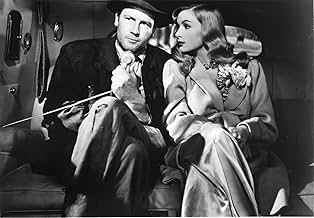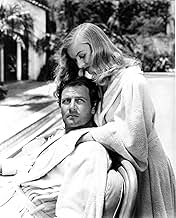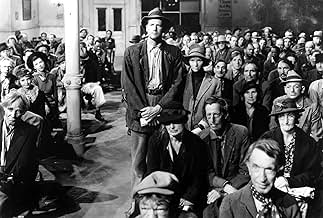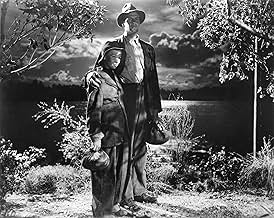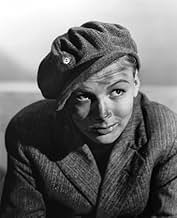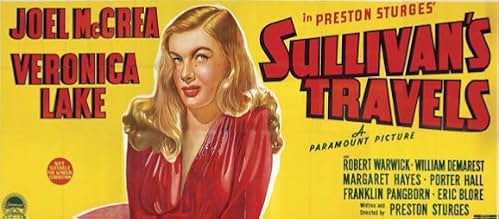IMDb-BEWERTUNG
7,9/10
29.868
IHRE BEWERTUNG
Ein Hollywood-Regisseur, John L. Sullivan, macht sich auf den Weg, das Leben als armer, obdachloser Mensch zu erleben, um relevante Lebenserfahrung für seinen nächsten Film zu sammeln.Ein Hollywood-Regisseur, John L. Sullivan, macht sich auf den Weg, das Leben als armer, obdachloser Mensch zu erleben, um relevante Lebenserfahrung für seinen nächsten Film zu sammeln.Ein Hollywood-Regisseur, John L. Sullivan, macht sich auf den Weg, das Leben als armer, obdachloser Mensch zu erleben, um relevante Lebenserfahrung für seinen nächsten Film zu sammeln.
- Auszeichnungen
- 2 wins total
Charles R. Moore
- Colored Chef
- (as Charles Moore)
Empfohlene Bewertungen
Preston Sturges (1898-1959) wrote over 40 film screenplays spanning the years 1930-1958 and directed over a dozen films 1940-1955. His first attempt at directing was a success with a string of two popularly and critically acclaimed films in each of the years 1940 and 1941, "The Great McGinty", "Christmas in July"; "The Lady Eve" (starring Henry Fonda and Barbara Stanwyck), and this film, "Sullivan's Travels".
The beauty of "Sullivan's Travels" is the combination in genre of comedy as well as social satire and realism of the tough times of the Great Depression that the country had just weathered for a decade. Throw a romance in to the mix and a level of redirection of a "film on film" to make this an interesting film.
John Sullivan (Joel McCrea) is a famous director who is at odds with his production company. They want him to direct a comic film, while he wants to apply his talent to creating an analytic looking glass onto the sobering times called, "O Brother, Where Art Thou?". Wealthy and successful, he is mocked for not at all knowing misfortune - how would he make such a film? John takes this as a challenge, dresses as a hobo, and leaves the studio with a dime in his pocket to explore what life is like for the down and out.
However he tries to flee, he ends up getting somehow quickly being returned to Hollywood. Early on, he meets "the girl" (Veronica Lake; I don't recall her ever being given a name in the film) who sees that he is too innocent to survive on his own, and insists on bringing her broader knowledge of society to the journey and joining him to get him through this learning adventure.
The first part of the film is comic, but just as it seems to be coming to an unfulfilled ending, something unexpected happens. This event alters the course of everything and exposes John to some of the true injustices of the time - and shows him (and poignantly reminded me) that comedy is particularly important when some people have nothing else to cheer them up.
This is a film of classic Hollywood vintage, with good, snappy performances by both of the lead actors. The romance isn't at all developed but just seems to happen in a matter-of-fact way (perhaps we can take it on faith that there is instant chemistry), but what is lacking in psychology of the relationship is made up for in the chilling glimpse we get of the psyche of the underdog in Depression America.
--Dilip Barman June 19, 2004
The beauty of "Sullivan's Travels" is the combination in genre of comedy as well as social satire and realism of the tough times of the Great Depression that the country had just weathered for a decade. Throw a romance in to the mix and a level of redirection of a "film on film" to make this an interesting film.
John Sullivan (Joel McCrea) is a famous director who is at odds with his production company. They want him to direct a comic film, while he wants to apply his talent to creating an analytic looking glass onto the sobering times called, "O Brother, Where Art Thou?". Wealthy and successful, he is mocked for not at all knowing misfortune - how would he make such a film? John takes this as a challenge, dresses as a hobo, and leaves the studio with a dime in his pocket to explore what life is like for the down and out.
However he tries to flee, he ends up getting somehow quickly being returned to Hollywood. Early on, he meets "the girl" (Veronica Lake; I don't recall her ever being given a name in the film) who sees that he is too innocent to survive on his own, and insists on bringing her broader knowledge of society to the journey and joining him to get him through this learning adventure.
The first part of the film is comic, but just as it seems to be coming to an unfulfilled ending, something unexpected happens. This event alters the course of everything and exposes John to some of the true injustices of the time - and shows him (and poignantly reminded me) that comedy is particularly important when some people have nothing else to cheer them up.
This is a film of classic Hollywood vintage, with good, snappy performances by both of the lead actors. The romance isn't at all developed but just seems to happen in a matter-of-fact way (perhaps we can take it on faith that there is instant chemistry), but what is lacking in psychology of the relationship is made up for in the chilling glimpse we get of the psyche of the underdog in Depression America.
--Dilip Barman June 19, 2004
Having read some of the negative views on this film, I think it's necessary to take the long view. Anybody can have an opinion, but when people like Steven Spielberg, George Lucas, Sydney Pollack, Leonard Maltin and Roger Ebert place this film in their best 20 list, there must be a reason. First, Preston Sturgis, a genius, they even named a building after him on the Paramount Studio Lot. Seven big hit films in seven years, plus he had a giant reputation as a Broadway playwright. Although some may disagree, I think this film was his masterpiece. The scene in the poor black church, where the convicts go in shackles is so brilliant, it ranks with some of the best filmmaking on the planet. I've heard people say it was stereotypical, yet unfortunately, that's the way it was then. The juxtaposition of the convicts, who had lost their civil rights, and the poor African Americans who never had civil rights, mated to the song, "Let My People Go", puts this film heads and shoulders against anything anybody was doing in 1942.
Joel McCrea gives the performance of his career. I fell totally in love with Veronica Lake; who wouldn't? The first scene lasts five minutes without a cut. To the MTV generation this is mortal sin, but Sturgis, having come from the theater, lets his actors, act. When I was a film student, I learned more from this film, than any other of which I can think at the moment. It is a classic's classic. If you choose not to watch it, then you're missing something that formed the directing habits of the best directors of our era. In other words, you are the loser.
10/10
Joel McCrea gives the performance of his career. I fell totally in love with Veronica Lake; who wouldn't? The first scene lasts five minutes without a cut. To the MTV generation this is mortal sin, but Sturgis, having come from the theater, lets his actors, act. When I was a film student, I learned more from this film, than any other of which I can think at the moment. It is a classic's classic. If you choose not to watch it, then you're missing something that formed the directing habits of the best directors of our era. In other words, you are the loser.
10/10
Sturges' most daringly double-edged film, laced with bitter ironies. It is also arguably the most audacious film in Hollywood's (mainstream) history, audacious because it takes the kinds of risks that can so easily fall flat on their face, and right until the final image, as Sturges becomes increasingly ambitious and multi-layered, you wonder how long he can keep it up without getting ridiculous. It never does, but the film is so full of contradictions, tensions, suppressions, clanging lurches in tone - 'Travels' is ostensibly a comedy, and one of Hollywood's best, but the last twenty minutes are truly painful to watch, harrowing and not at all funny.
The overriding source of tension, of course, is the film itself, the plot, and the emotions that are supposed to be elicited. It is very difficult, and frequently impossible to gauge the tone of any one scene. Sometimes this is straightforward, as when information is deliberately withheld from the audience, it is asked to make a judgement, and then shown to be wrong, as in the scenes where the studio moguls claim a background of deprivation (which is historically plausible). This kind of comedy is familiar enough.
But what about the later montage of Sullivan and the Girl experiencing the 'reality' of poverty - are these scenes supposed to be genuine representation of poverty? Are they part of a wider satire on pious films like 'Grapes of Wrath', which dubiously aestheticise poverty - there are a lot of Expressionistic flourishes in this sequence? Are they a kind of abstract purgatory through which Sullivan finds spiritual understanding?
There is a big difference between the representation of poverty in this sequence and the one where Sullivan is attacked and sent to prison. But is one more 'authentic' than the other - the second one bravely rejects the view of 'noble' poverty, shows how it dehumanises people, turns them instinctual and brutal; but it also provides a neat moral, which suggests that if you do somebody wrong, you will be (horribly) punished for it. This realism, therefore, is as contrived as the first. Is this Sturges' point, that the good intentions of realism are always tainted by ideological assumptions, patronising good-will, or motives of elevation. This sense of artifice, of a film comprised of varying self-reflexive modes rather than a plausible narrative, runs through 'Travels', with characters talking about the film they're in as a plot - in direst danger, Sullivan acknowledges the need for a helluva twist which duly arrives, filmed in silent slapstick with barely concealed Sturges contempt (and did his friends seem terribly put out by his death?).
This would seem to uphold 'Travels'' ostensible theme, its celebration of comedy as a sugar with which to sweeten the harshness of reality. This is a very cynical view of comedy, and a highly manipulative, conservative one - distract an unhappy populace from the injustice of their lives. The best comedies - from 'Sherlock Jr' and 'Modern Times' to 'Playtime' and 'The Discreet Charm of the Bourgeoisie' have always been about real life, encouraging their viewers to think harder about the society they live in, much more effectively than so-called naturalism.
'Travels' is no exception. It might be a celebration of comedy, but this is comedy a million miles from 'Ants in your Pants'. What other 40s film still manages to show the brutality of poverty, of the prison system, of race relations, the fate of young women in sexually voracious Hollywood (the Girl's ease with her body in the swimming pool scene speaks volumes), however we choose to read them? When Sullivan's determination at the end to continue making populist comedies is endorsed by the ringing laughter of the world's meek and suffering, the disjunction is grotesque. This is a man, on an airplane, completely removed from reality, surrounded by wealthy toadies. Those happy laughs could so easily be contemptuous guffaws, because what Sullivan wants to do, and Sturges hasn't, is hide the inequalities of capitalism, the system on which Hollywood thrives, and the flaws in which they would be only too happy to cover up with inanity. But to even suggest this is to fall into the 'Capra' trap mocked at the beginning.
This difficulty is what makes 'Travels' such a stunningly modern film - its shifts from sophisticated verbal wit to elaborate slapstick to blatant Carry On-like innuendo (the matronly sister dusting the bedpost after seeing a sweating, shirtless Sullivan work) to tragedy to hallucination and dream to satire foreshadows Melville and the New Wave, while the privileged rich man who cannot escape Hollywood would transmute into the guests who can't leave the house, or can't get dinner in later Bunuel films; or the film that begins with an end. The opening sequence takes off 'Citizen Kane'. The deadpan genderplay is quietly gobsmacking, and Veronica Lake as a (gorgeous) tramp would be alluded to by Jeanne Moreau in 'Jules et JIm'. But the joys are all Sturges', as he democratises comedy (see again that swimming pool sequence); I love in particular those glorious supporting actors: my favourite being the immortal Eric Blore and Robert Greig as Sullivan's servants.
The overriding source of tension, of course, is the film itself, the plot, and the emotions that are supposed to be elicited. It is very difficult, and frequently impossible to gauge the tone of any one scene. Sometimes this is straightforward, as when information is deliberately withheld from the audience, it is asked to make a judgement, and then shown to be wrong, as in the scenes where the studio moguls claim a background of deprivation (which is historically plausible). This kind of comedy is familiar enough.
But what about the later montage of Sullivan and the Girl experiencing the 'reality' of poverty - are these scenes supposed to be genuine representation of poverty? Are they part of a wider satire on pious films like 'Grapes of Wrath', which dubiously aestheticise poverty - there are a lot of Expressionistic flourishes in this sequence? Are they a kind of abstract purgatory through which Sullivan finds spiritual understanding?
There is a big difference between the representation of poverty in this sequence and the one where Sullivan is attacked and sent to prison. But is one more 'authentic' than the other - the second one bravely rejects the view of 'noble' poverty, shows how it dehumanises people, turns them instinctual and brutal; but it also provides a neat moral, which suggests that if you do somebody wrong, you will be (horribly) punished for it. This realism, therefore, is as contrived as the first. Is this Sturges' point, that the good intentions of realism are always tainted by ideological assumptions, patronising good-will, or motives of elevation. This sense of artifice, of a film comprised of varying self-reflexive modes rather than a plausible narrative, runs through 'Travels', with characters talking about the film they're in as a plot - in direst danger, Sullivan acknowledges the need for a helluva twist which duly arrives, filmed in silent slapstick with barely concealed Sturges contempt (and did his friends seem terribly put out by his death?).
This would seem to uphold 'Travels'' ostensible theme, its celebration of comedy as a sugar with which to sweeten the harshness of reality. This is a very cynical view of comedy, and a highly manipulative, conservative one - distract an unhappy populace from the injustice of their lives. The best comedies - from 'Sherlock Jr' and 'Modern Times' to 'Playtime' and 'The Discreet Charm of the Bourgeoisie' have always been about real life, encouraging their viewers to think harder about the society they live in, much more effectively than so-called naturalism.
'Travels' is no exception. It might be a celebration of comedy, but this is comedy a million miles from 'Ants in your Pants'. What other 40s film still manages to show the brutality of poverty, of the prison system, of race relations, the fate of young women in sexually voracious Hollywood (the Girl's ease with her body in the swimming pool scene speaks volumes), however we choose to read them? When Sullivan's determination at the end to continue making populist comedies is endorsed by the ringing laughter of the world's meek and suffering, the disjunction is grotesque. This is a man, on an airplane, completely removed from reality, surrounded by wealthy toadies. Those happy laughs could so easily be contemptuous guffaws, because what Sullivan wants to do, and Sturges hasn't, is hide the inequalities of capitalism, the system on which Hollywood thrives, and the flaws in which they would be only too happy to cover up with inanity. But to even suggest this is to fall into the 'Capra' trap mocked at the beginning.
This difficulty is what makes 'Travels' such a stunningly modern film - its shifts from sophisticated verbal wit to elaborate slapstick to blatant Carry On-like innuendo (the matronly sister dusting the bedpost after seeing a sweating, shirtless Sullivan work) to tragedy to hallucination and dream to satire foreshadows Melville and the New Wave, while the privileged rich man who cannot escape Hollywood would transmute into the guests who can't leave the house, or can't get dinner in later Bunuel films; or the film that begins with an end. The opening sequence takes off 'Citizen Kane'. The deadpan genderplay is quietly gobsmacking, and Veronica Lake as a (gorgeous) tramp would be alluded to by Jeanne Moreau in 'Jules et JIm'. But the joys are all Sturges', as he democratises comedy (see again that swimming pool sequence); I love in particular those glorious supporting actors: my favourite being the immortal Eric Blore and Robert Greig as Sullivan's servants.
After the opening credits, the film opens with the following statement.
"To the memory of those who made us laugh: the motley mountebanks, the clowns, the buffoons, in all times and in all nations whose efforts have lightened our burden a little, this picture is affectionately dedicated."
With this film, Preston Sturges made one of the smartest and most insightful comedies ever to come out of Hollywood, in which he especially held up the mirror to Tinseltown itself. A Hollywood variation on Gulliver's Travels, it's the tale of Hollywood director John Sullivan (Joel McCrea), tired of making Hollywood Fluff, who wants to branch out with a socially conscious epic, called "O Brother, Where Art Thou", and sets out to research the meaning of poverty. His studio bosses (very funny roles by Robert Warwick and Porter Hall) try to tell him it's a ridiculous idea but Sullivan insists, puts on some hobo clothes and sets out to see what it's like to experience poverty and suffering. The studio soon sees it as potential publicity stunt and sent an entire crew to follow him around during his trip.
Some very enjoyable references to socially conscious movie-making, to Ernst Lubitch in particular, make this particularly fun with some knowledge of the period and the films mentioned, albeit not necessary. And almost worth seeing alone for Veronica Lake's memorable performance as a failed starlet.
According to Sturges, the film did contain a little "message":
"SULLIVAN'S TRAVELS is the result of an urge, an urge to tell some of my fellow filmwrights that they were getting a little too deep-dish and to leave the preaching to the preachers."
By any means, he made a uniquely self-reflective comedy about Hollywood with wonderful characterizations and superlative performances. A brilliant satire with a "message" just as poignant as ever.
Camera Obscura --- 9/10
"To the memory of those who made us laugh: the motley mountebanks, the clowns, the buffoons, in all times and in all nations whose efforts have lightened our burden a little, this picture is affectionately dedicated."
With this film, Preston Sturges made one of the smartest and most insightful comedies ever to come out of Hollywood, in which he especially held up the mirror to Tinseltown itself. A Hollywood variation on Gulliver's Travels, it's the tale of Hollywood director John Sullivan (Joel McCrea), tired of making Hollywood Fluff, who wants to branch out with a socially conscious epic, called "O Brother, Where Art Thou", and sets out to research the meaning of poverty. His studio bosses (very funny roles by Robert Warwick and Porter Hall) try to tell him it's a ridiculous idea but Sullivan insists, puts on some hobo clothes and sets out to see what it's like to experience poverty and suffering. The studio soon sees it as potential publicity stunt and sent an entire crew to follow him around during his trip.
Some very enjoyable references to socially conscious movie-making, to Ernst Lubitch in particular, make this particularly fun with some knowledge of the period and the films mentioned, albeit not necessary. And almost worth seeing alone for Veronica Lake's memorable performance as a failed starlet.
According to Sturges, the film did contain a little "message":
"SULLIVAN'S TRAVELS is the result of an urge, an urge to tell some of my fellow filmwrights that they were getting a little too deep-dish and to leave the preaching to the preachers."
By any means, he made a uniquely self-reflective comedy about Hollywood with wonderful characterizations and superlative performances. A brilliant satire with a "message" just as poignant as ever.
Camera Obscura --- 9/10
As a TV Producer of "entertainment" shows, I make a point of watching this film at least once a year and giving DVDs of it to all who may disparage what I do.
Preston Sturges achieves the impossible in this movie: he has his cake and eats it too. He makes a perfect film - he manages to make a socially significant statement while wrapping it up in a comedy confection.
His hero, John L. Sullivan (Joel McCrea - a very underestimated actor) is a
succcessful director of frivolous musicals and comedies who, one day, decides he needs to make a Capra-esque "serious"film. His studio chiefs and immediate staff are against it and point out that he is rich and privileged, what does he know about the less fortunate? Sullivan retorts with an ingenious plan:
Sullivan: "You're perfectly right...but I'll tell you what I'm going to do first: I'm going to get some old clothes and some old shoes from wardrobe and start out with ten cents in my pocket...and I'm not coming back till I know what trouble it..I'm going out on the road to find out what it's like to be poor and needy and then I'm going to make a picture about it."
Burrows(his butler): If you'll permit me to say so, sir, the subject is not an interesting one. The poor know all about poverty and only the morbid rich would find the topic glamorous.
Nevertheless, Sullivan does it and unwittingly (and hilariously) discovers the true value comedy has in the lives of those with little else to laugh about...
It's genius. Exquisitely written, directed and acted (Sturges uses his usual ensemble plus the ever watchable Veronica Lake, even here in her most improbable disguises [I met her, professionally, in England in the 70s, she was still a class act and her "rider" demanded her drink of choice - vodka and cranberry juice).
Sullivan's Travels is a true gem of American Cinema. Ten out of ten.
Preston Sturges achieves the impossible in this movie: he has his cake and eats it too. He makes a perfect film - he manages to make a socially significant statement while wrapping it up in a comedy confection.
His hero, John L. Sullivan (Joel McCrea - a very underestimated actor) is a
succcessful director of frivolous musicals and comedies who, one day, decides he needs to make a Capra-esque "serious"film. His studio chiefs and immediate staff are against it and point out that he is rich and privileged, what does he know about the less fortunate? Sullivan retorts with an ingenious plan:
Sullivan: "You're perfectly right...but I'll tell you what I'm going to do first: I'm going to get some old clothes and some old shoes from wardrobe and start out with ten cents in my pocket...and I'm not coming back till I know what trouble it..I'm going out on the road to find out what it's like to be poor and needy and then I'm going to make a picture about it."
Burrows(his butler): If you'll permit me to say so, sir, the subject is not an interesting one. The poor know all about poverty and only the morbid rich would find the topic glamorous.
Nevertheless, Sullivan does it and unwittingly (and hilariously) discovers the true value comedy has in the lives of those with little else to laugh about...
It's genius. Exquisitely written, directed and acted (Sturges uses his usual ensemble plus the ever watchable Veronica Lake, even here in her most improbable disguises [I met her, professionally, in England in the 70s, she was still a class act and her "rider" demanded her drink of choice - vodka and cranberry juice).
Sullivan's Travels is a true gem of American Cinema. Ten out of ten.
Wusstest du schon
- WissenswertesCinematographer John Seitz admired Preston Sturges' unconventional approach to his work. The opening scene comprised ten pages of dialogue to cover about four and a half minutes of screen time. It was scheduled for two complete days of shooting. On the morning of the first day, Seitz found Sturges inspecting the set with a viewfinder, looking for where he could cut the scene and change camera set-ups. Seitz dared him to do it all in one take. Never one to refuse a dare, Sturges took him up on it, although the nervous Seitz had never attempted to complete a two-day work schedule in one day. With the endorsement of McCrea and the rest of the actors, Sturges pressed on, determined to set a record. The first take was fine, but the camera wobbled a little in the tracking shot following the men from screening room to office, so they tried again. They did two or three takes at the most and that was it - two full days work by 11 a.m. on the first day, a feat that had the entire studio buzzing.
- PatzerWhen Sullivan and the Girl jump off the train and walk to the lunch stand, nothing is visible around the outside of the lunch stand--not a car, tree or anything. When Sullivan asks if the proprietor had seen a land yacht (a big RV), the proprietor points to the side and they look out the window and see the big land yacht parked there. Of course, if it had been there in the first place, Sullivan would have seen it right away and not gone into the lunch stand.
- Zitate
[last lines]
John L. Sullivan: There's a lot to be said for making people laugh. Did you know that that's all some people have? It isn't much, but it's better than nothing in this cockeyed caravan.
- Crazy CreditsThe Paramount logo appears as a seal on a package.
The package is opened to reveal a book with the film title on it and the opening credits appear on pages in the book.
- VerbindungenFeatured in The Cinematographer (1951)
- SoundtracksSpring Song
(1844) (uncredited)
Written by Felix Mendelssohn
Played as part of the score when Sullivan starts his experiment
Reprised when he starts a second time
Top-Auswahl
Melde dich zum Bewerten an und greife auf die Watchlist für personalisierte Empfehlungen zu.
Details
Box Office
- Budget
- 689.665 $ (geschätzt)
- Weltweiter Bruttoertrag
- 10.390 $
- Laufzeit1 Stunde 30 Minuten
- Farbe
- Seitenverhältnis
- 1.37 : 1
Zu dieser Seite beitragen
Bearbeitung vorschlagen oder fehlenden Inhalt hinzufügen

Oberste Lücke
By what name was Sullivans Reisen (1941) officially released in Canada in French?
Antwort

